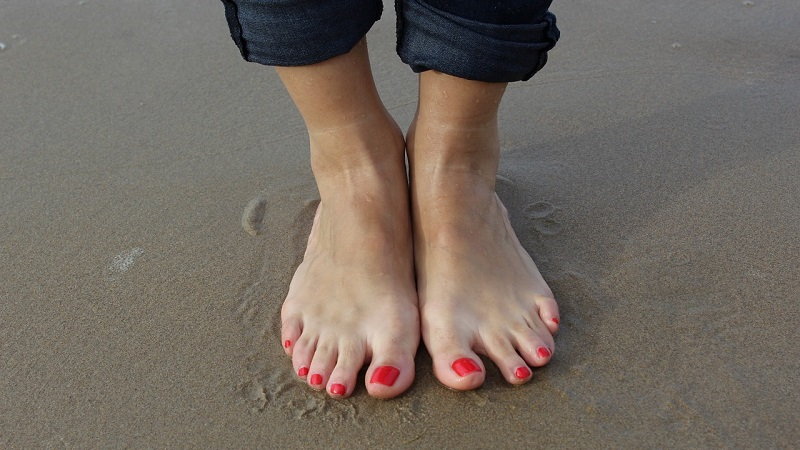Knowing how to get rid of hard skin on feet is one thing, but doing it correctly to make sure that the problem does not continue to recur is something else. This is something that a number of people will suffer from at some point in their life, but the good news is that it is actually easy to not only treat, but stay on top of the problem.
Look at these 11 proven methods on how to get rid of hard skin on feet.

Table of Contents
- 1. Go electric to help you out
- 2. Get a professional to help
- 3. Going natural with almond oil aka ‘Home Remedies’
- 4. Helping yourself at night with cotton socks
- 5. The age old way of using a pumice stone
- 6. Wear properly fitted footwear
- 7. Enjoy daily moisturising & massage
- 8. Soak your feet
- 9. Eat a skin-friendly diet
- 10. Take skin-friendly supplements
- 11. Exercise your feet
1. Go electric to help you out
A method that a lot of people are now using is going electric and that means checking out products such as the Emjoi Micro Pedi, the Scholl Wet & Dry Pedi, or the Scholl Velvet Smooth Express Pedi. Basically, these machines are going to use battery power to clear up that hard skin so that you can then look at trying to get the new skin that is revealed into better shape. These machines do work, but do be prepared for being surprised at just how much hard skin it manages to scratch off. If you need a quick and effective solution, you will hardly find better than an electric hard skin remover.
2. Get a professional to help
In severe cases it may be best to initially seek some professional help from a podiatrist or a pedicurist to get on top of your issue. They can help to remove a substantial amount of hard skin without you having to worry about the potential of damaging the delicate skin underneath and there is no doubt that your feet will feel brand new. However, we still go back to the age old problem of how to stop it from then just reappearing and that comes down to your own ability to really look after the health of your feet.
3. Going natural with almond oil aka ‘Home Remedies’
Almond oil has been used for centuries to help with various skin conditions and a number of people swear by it when they are trying to get rid of hard skin on their feet. The key here is to soak your feet for at least 15 minutes in some lukewarm water as this will help to initially soften the skin even slightly. After patting them dry, you then need to apply the almond oil to the hardened areas and really allow it to soak in.
Do note that it may take several treatments before you start to see a difference, but the almond oil is brilliant at adding some moisture to those callused areas and helping to bring them back to life. If you cannot get your hands on almond oil, then some people say that olive oil also works for them in the same way.
4. Helping yourself at night with cotton socks
This is a method that you should only use at night for when you are sleeping. Prior to going to bed, soak your feet in lukewarm water just as described before and then apply some Vaseline to the affected areas. After this, wear some cotton socks whilst in bed as this will allow the Vaseline time to really work into the skin and even if it does not make a difference at first, there should be an improvement in your feet within a few days.
5. The age old way of using a pumice stone
This might sound slightly old-fashioned, but a pumice stone is still going to be more than capable of helping you to get rid of that hardened skin on your feet. It might seem pretty basic, but the stone does break up the skin with you then advised to wipe your feet after it to help remove all of the flakes that have been produced.
As with the other methods, it is then up to you to add more moisture to your feet to really make a difference. A pumice stone is also a good way to keep on top of the problem, so consider using it on a regular basis and your chances of then developing a series problem with hard skin on your feet will be greatly reduced.
6. Wear properly fitted footwear
Hard skin forms on your feet for a reason. It is there to protect your feet against rubbing, pressure and other potentially damaging circumstances. For this reason, it is very important that you wear properly fitted footwear. It is much smarter to invest in a couple of pairs of well-fitted shoes than to fill your closet with inexpensive, trendy shoes. Remember that your feet are the foundation of your body, so give them ample support and padding. Cushiony, absorbent socks and orthotic inserts and foot insoles are also helpful.
7. Enjoy daily moisturising & massage
Your feet benefit from daily moisturising just as does your face and the rest of your body. Massage in a rich moisturiser (coconut oil is good) at bedtime, and wear absorbent socks to prevent damaging your sheets and to help your skin soak up the lotion or oil. Before you put your socks and shoes on in the morning, massage in a lighter lotion or cream. A good commercial hand or foot lotion will do the trick. Keeping the skin on your feet consistently moisturised will help soften and heal hard skin.
8. Soak your feet
There is nothing more relaxing that a nice foot soak at the end of a long, hard day. Make it a point to soak your feet in warm, scented water and follow up with a pedicure and a moisturising treatment at least three times a week. You can just use a regular basin, but investing in a nice foot spa is a great way to treat yourself to a stress relieving, luxurious experience.
9. Eat a skin-friendly diet
The skin on your feet is just as subject to dietary deficiencies as the skin on the rest of your body. Be sure to eat a healthy, whole-foods diet consisting of plenty of fresh produce and high quality, lean protein sources. Avoid sugar, alcohol and unhealthy (hydrogenated) oils. Include healthy oils, such as coconut oil and extra-virgin olive oil to feed and moisturise your skin from within. Drink lots of pure, filtered water to stay properly hydrated. Following a healthy, natural diet will improve the quality of your skin, hair and nails and your general health.
10. Take skin-friendly supplements
For overall good health, you should be sure to take a high quality multi-vitamin daily. Additionally, to benefit your skin, you should supplement with flax seed oil or fish oil. Both provide omega 3 fatty acids that will help keep your skin soft and smooth all over. Additionally, these valuable oils boost your immune system, support your central nervous system and promote joint health.
11. Exercise your feet
Keeping the joints in your feet flexible can help prevent hard skin. When you experience joint stiffness, arthritis, bunions and other foot abnormalities, your body’s natural response is to form calluses to protect the ailing area. Be sure to take a few minutes a day to perform some simple foot exercises. Here are a few ideas:
- Circle your feet. Rotate your ankles ten times in each direction.
- Flex your feet by pointing your toes up and down 10 times.
- Roll your feet heel-to-toe against the floor 10 times each.
- Massage the arches by rolling a tennis ball underfoot while seated.
- Invest in an electric foot massager to give your feet a good shaking up!
You can do these exercises while seated at your desk, while watching television and/or when you do your morning and evening foot massage and moisturising. Exercising your feet helps keep your joints flexible and promotes good circulation in your feet and lower legs. Healthy feet are less likely to develop hard skin.
Those are just some examples of ways in which you can indeed remove hard skin from your feet, but just remember that what works well for one person may not work as well for you and vice versa. However, the key point is that you do not have to suffer from this condition and there are cures out there, but if you take good care of your feet from the outset, then this problem might never happen.







I wholeheartedly agree with the use of coconut oil, as a means of serving to improve the condition of the skin upon the feet, while also maintaining its appearance thereafter.
While my feet had never been in poor condition, largely due to the level of care I’ve afforded them over the years (I’m a runner), upon discovering coconut oil (and its benefits) around 4 years ago, their appearance has improved without measure, not least that of my nails.
As such, its application has become part of my daily foot care regime; something that my feet certainly cannot be without.
Thanks for such an awesome article.